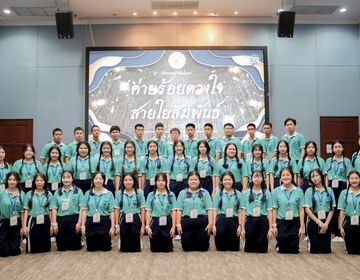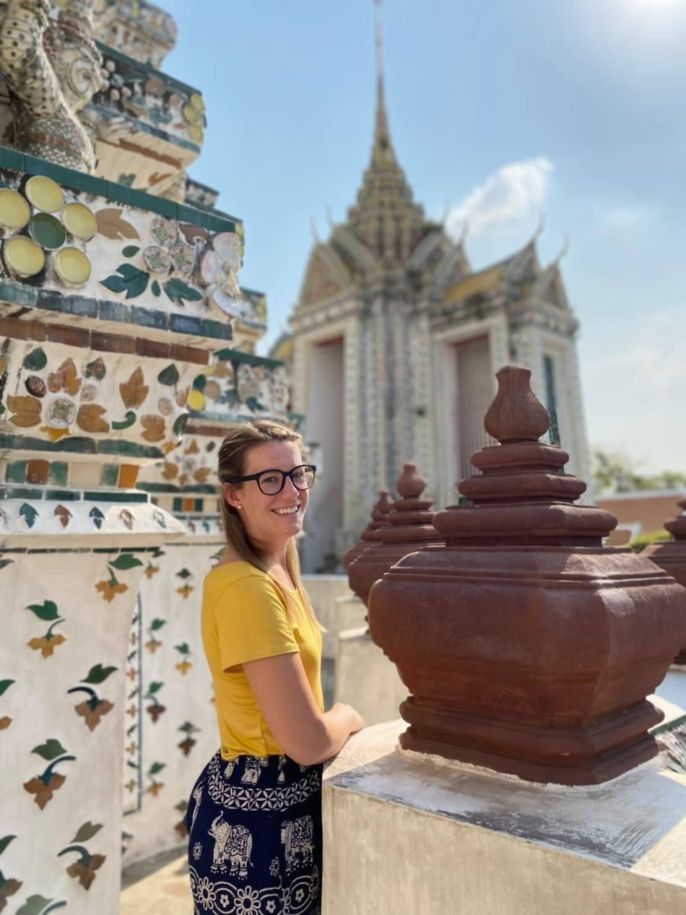All Your Questions Answered
I was recently asked to do an Instagram takeover on the CIEE Instagram page and had the opportunity to show the public what daily life was like living and teaching in Thailand! After it was over, I was able to answer questions about my experience and so many of the questions that were asked, were questions I once had that I couldn't easily find the answer to.
I'm writing this blog in hopes that many of your questions will be answered and you will have a better understanding of what life is like in Thailand! Of course, CIEE has a list of basic questions on the Teach in Thailand page but after completing the CIEE Instagram takeover, it was evident that so many people still had great questions but wasn't sure where to find the answers.
All of the answers to these questions are based on my own personal experience arriving in December so not every situation will be the exact same.
Here are the top 10 questions that were asked:
1. Is it easy to meet other CIEE teachers?
Absolutely! Before you begin teaching, you will attend a weeklong orientation with all the teachers that come. You are also placed in a Facebook group prior to departure so you can interact and learn about your future colleagues. When you arrive in Thailand, you will get to know the other CIEE teachers during orientation and eventually you will get their contact information. I've seen almost every single teacher that came in December in different parts of Thailand. A lot of times, CIEE teachers will go to similar places in Thailand for long weekends/holidays so it's easy to meet up. One vacation, we ended up meeting up with 20 CIEE teachers for dinner and drinks! Even though you end up in different parts of the country, you still stay in contact through social media, so it is pretty easy to meet up if you want to.
2. How do you decide what part of Thailand to live in?
During the application process, you have the opportunity to rank what region of Thailand you would prefer to live in- Northern, Central, Southern, or Eastern. I was unsure of what the different areas had to offer so I did a simple Google search to find out more information about each area. If you want a more local and cultural experience, the Northern and Eastern parts of Thailand are great. In these parts of Thailand, there will be less English-speaking people and less tourists which will allow you to use Thai language more and become friends with the locals. The central part of Thailand is great if you want the ability to travel easier or be in an area with a few more English speakers. Choosing the location is up to you and what you want out of the experience.
3. How old is too old?
The age requirement for Teach Abroad in Thailand is 55. Although many of the teachers are below the age of 30, we did have a few teachers over the age of 30 and are loving it just as much as the younger teachers!
4. Do a lot of people teach abroad right out of college?
YES! When I arrived in Thailand, there were about 55 teachers that came in my group. I would say about half of them had graduated within the last year, some with education degrees and some not. Those straight out of college without teaching experience are doing just fine!
5. How did you find roommates?
When you complete the application, there will be a section that you rank what is most important to you when moving to Thailand. Is location, grade level being taught, or being placed with another CIEE teacher most important? To me, being placed with another CIEE teacher, brand new or a past CIEE teaching still working there, was most important. If being placed with another teacher is your top choice, you will most likely be placed with one. We all have our own room but live in the same building.
6. Do you find the language barrier to be difficult?
Some days, the language barrier is difficult. If you are living in or near a big city, you will find more English speakers and it's relatively easy to communicate. The smaller the town, the less English speakers you will find. At our local market, the English that is spoken is extremely limited. Most of the time, if the locals see that you are trying, they are very patient. Smiles and body language go a long way! Google translate is a hit or miss with the correct translation, so I try to have basic phrases memorized that I use daily.
7. How was the culture shock?
If you have an open mind, it won't be too hard! Keep in mind that you are moving into their culture and it's important that you adapt to their culture as best as you can. If you have an open mind and don't mind being really flexible, it isn't too bad. Of course, there will be things that you will struggle with upon arrival and a few months after, but it's worth it. Living in a new culture and experiencing new things every day makes you a well-rounded person!
8. What has been the most difficult part?
For me, the hardest part has been the food. Many of the other CIEE teachers absolutely love the food but I am very picky, so it's been a challenge. I've become more open to different foods and always try new food but I haven't found anything that I love. Shopping for groceries is significantly more expensive so I try to shop at the markets as much as possible. I typically stick to the same foods and don't branch out as much as I should.
Another thing that has been difficult is the fact that things are always changing, and you don't always stay in the loop. My school may make an announcement or ask me to do something but the possibility of it changing are very high. I've learned to be really flexible and never set my mind on something because things can change so quickly. Thai people don't always do the best job communicating either which can be frustrating. I've noticed Thai people have a very go with the flow type attitude.
9. Is it easy to travel around Thailand?
Absolutely! There is always somewhere new to explore in Thailand. Whether you have a long weekend, vacation, or just a normal weekend, your opportunities are endless! There are so many different ways to travel around Thailand. Depending on your budget and length of time, you can find the perfect way to travel. If you are on a time crunch, a taxi, tuk tuk, songthaew, or a quick flight are the best option. If you have more time, a train, overnight train, or bus are a great option. Most of the different types of transportation are very reasonable and all provide a different experience. I encourage you to try all the types of transportation when you are here!
10. Are there other English teachers at your school?
My campus is a bit smaller than most schools because my school is only Kindergarten and Nursery. At my campus, we have 4 English teachers but at the larger campuses, there are many English teachers. Not all English teachers will be from America, so we call all the English teachers foreign teachers and they come from all over the world which is really cool! It's fun to learn about other cultures while living and teaching in Thailand.
You can look on CIEE's webpage, Teach in Thailand, to find out more information about the program. You are always welcome to find me on social media and ask me any questions!
Related Posts

Thailand Through the Eyes of My 12th Grade Thai Students
What makes Thailand truly unique beyond its temples and street food? In this reflection, my 12th grade students in Thailand share what their country looks like from the inside — not as a tourist destination, but as home. Through their honest words, we see how Thai culture balances tradition and modern life, how respect, family values, and kindness shape daily experiences. Their perspectives offer an authentic glimpse into Thai society through the eyes of the next generation.

How Schools Shape Students in Thailand: A word from my students
What does school truly teach beyond textbooks and exams? In this reflection, three Thai students offer an inside look at how education shapes not only their academic futures, but their character and identity. Through their voices, we see that Thai schools function as more than places of learning — they are spaces where discipline, ambition, cultural pride, and respect are carefully cultivated. From the belief that education determines one’s future, to the daily practice of courtesy and social harmony, these students reveal how Thai education prepares young people not just for university, but for life. Their perspectives offer a powerful reminder that schools reflect the values of the society they serve.
My Halfway Mark: 5 Things I've Learned Teaching In Thailand
At the halfway point of my journey teaching in Thailand, I’ve realized this experience is about far more than lesson plans and classrooms. It is about adaptability, humility, courage, and connection. In this reflection, I share the five most important lessons I’ve learned so far, from learning to “be like water” in moments of uncertainty to saying yes to opportunities that push you beyond your comfort zone. This is not just advice for teachers in Thailand. It is a reminder that when you give your whole heart to a community, embrace growth, and choose courage daily, the experience will transform you in ways you never expected.

